美国企业的创新能力如何?来这三家公司看看
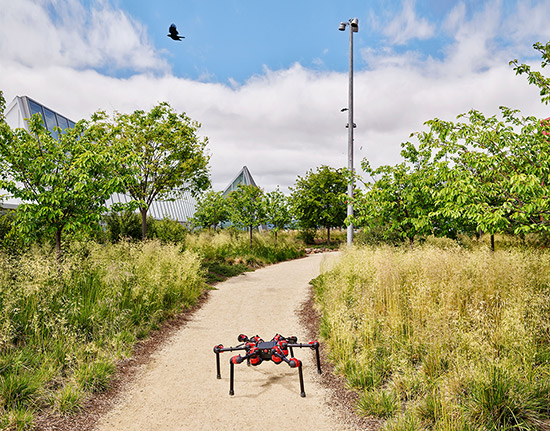
《财富》美国500强排名:第57位
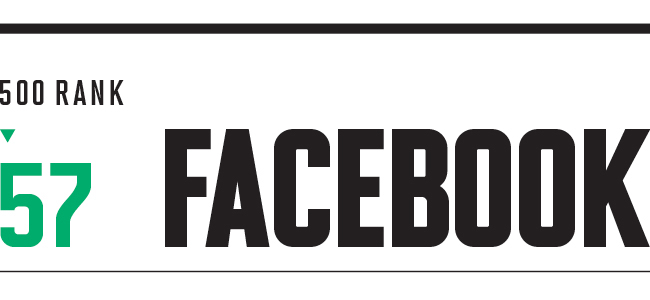

|
在Facebook的人工智能研究实验室,这家线上平台正在教机器人如何学习。Facebook承诺与朋友分享成果。 六足机器人黛西出生于Facebook新的人工智能实验室里,当它在公司位于加州门洛帕克总部大楼郁郁葱葱的屋顶上掠过时,传递着这样的信息:未来属于那些会教授、会学习的人。 这是Facebook人工智能研究机器人实验室的核心理念,该实验室以前从未公开,是2018年底推出的开源项目,正巧那时Facebook因为其广告产品引发用户对隐私的担忧而一再遭受非议。该实验室的目的是将机器人作为工具,更好地开发人工智能。“拥有具身智能是一个非常重要的问题,它会对你可以使用的算法种类造成限制。”Facebook的一位机器人研究科学家罗伯托·卡兰德拉说,“你需要拥有强大、高效且适用于现实世界的算法。” |
At the Facebook AI Research lab, the online publisher is teaching robots how to learn. It promises to share the results with its friends. Daisy, a hexapod robot born in Facebook’s new artificial intelligence lab, scuttles across the -verdant roof of the company’s Menlo Park, Calif., headquarters with a message to deliver: The -future belongs to those who teach—and learn. That concept sits at the center of Facebook’s AI Research robotics lab, a previously unrevealed open-source project that launched in late 2018, even as the company endured repeated black eyes over privacy concerns related to its advertising products. The lab’s purpose is to use robotics as a vehicle for developing better A.I. “Having embodied intelligence is a really important problem because it creates constraints to the kinds of algorithms that you can use,” says Roberto Calandra, one of Facebook’s robotics research scientists. “You need to have algorithms that can be robust, efficient, and applicable in the real world.” |
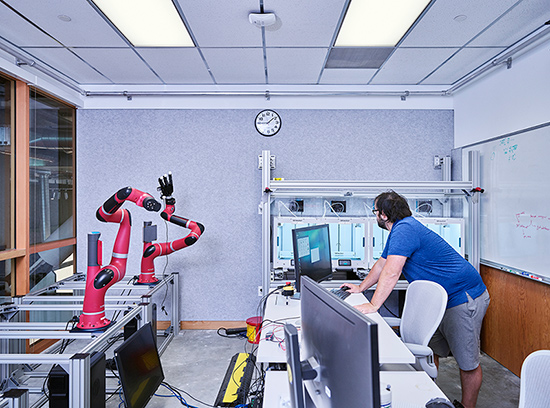
|
这就是为什么黛西能够沿着落满灰尘的小路闲逛具有如此重要的意义。让人工智能了解“噪音”——比如道路上的颠簸——不仅有助于黛西走得更好,而且更重要的是,有助于它学习如何学习。 卡兰德拉认为,触摸是学习的关键。但实验室的目标不仅仅是创造更多有触觉的机器人。毕竟这里是Facebook。因此,从最近的机器人和自动化国际会议开始,Facebook将学到的东西与其他人分享。 |
That’s why Daisy’s stroll along a dusty path is so significant. Introducing the A.I. to “noise”—like bumps in the road—not only helps the robot walk better but, more important, also helps Daisy learn how to learn. Touch, posits Calandra, is key to learning. But the lab’s goal isn’t merely to create more tactile robots. This is Facebook, after all. So starting at the recent International Conference on Robotics and Automation, what Facebook learns, it shares with others. |
李维斯
《财富》美国500强排名:第500位

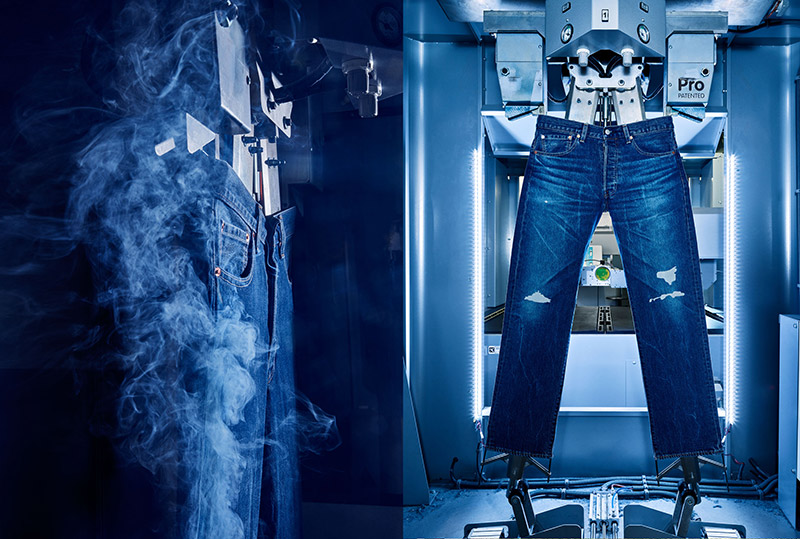
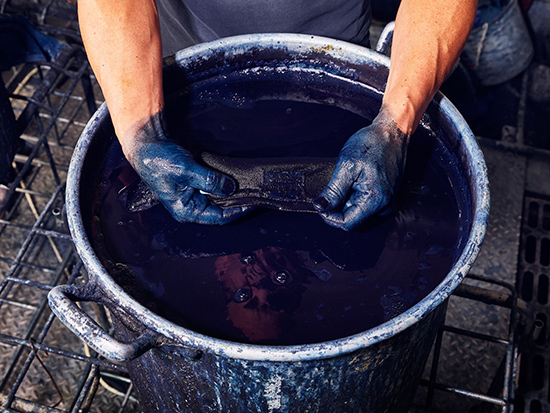
|
李维斯位于旧金山的尤里卡创新实验室(Eureka Innovation Lab)利用镭射、颜料和独创性保证该公司处于牛仔裤制造技术的前沿。 李维斯的尤里卡创新实验室位于旧金山电报山附近的一家小型模型工厂里,一点牛仔布都不生产。但是,它解决了这家166年历史的服装制造商的大问题,李维斯最近重新上市,并在七年内首次重返《财富》美国500强榜单。 比如说,在这个18000平方英尺空间的一个角落里,一个团队正在推进该公司的化学物质筛选计划,该计划旨在用更安全的物质取代对人类健康和环境有害的化学物质。在另一个角落里,一名工作人员正在用镭射做实验,想要在牛仔布的“洗水”工序中确保李维斯的供应链更加灵活。 |
Levi’s Eureka Innovation Lab in San Francisco uses lasers, pigments, and ingenuity to keep the jeansmaker technologically fashion-forward. Housed in a small prototyping factory in San Francisco’s Telegraph Hill neighborhood, Levi’s ¬Eureka Innovation Lab churns out not a stitch of denim. Instead, it solves big problems for the 166-year-old apparel maker, which recently relisted its shares publicly and returns to the Fortune 500 for the first time in seven years. For instance, in one corner of the 18,000-square-foot space, a team works on the company’s Screened Chemistry Program, which seeks to replace chemicals that are hazardous to human health and the environment with safer alternatives. In another corner, a crew experiments with lasers to make Levi’s supply chain more agile during the denim’s “finishing” process. |
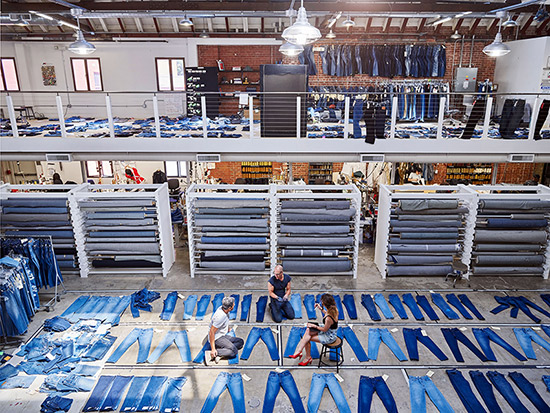
|
“四十年前,只有三种洗水方法:重石洗、中度石洗、轻石洗。”李维斯的技术创新副总裁巴特·赛茨说,“快进到今天,我们每个季节都要做大约1000种不同的洗水。这还只是我们公司。”使用新的镭射洗水工艺,该公司基本上已经重返未来,只生产三种基本款式,然后让李维斯遍布各地的工厂在当地完成牛仔裤洗水。 尤里卡创新实验室共有30名工作人员,包括裁缝、软件开发员和其他专家。所有人都有一个共同点:每个人都知道如何生产公司传奇的501牛仔裤。 |
“Forty years ago, there were only three finishes: dark stonewash, medium stonewash, and light stonewash,” says Bart Sights, Levi’s vice president of technical innovation. “Fast-forward to today, we do about a thousand different finishes every season. Just our company.” Using the new laser-finishing treatment, the company has essentially gone back to the future, producing only the three base styles, then letting far-flung Levi facilities finish the jeans locally. Eureka’s 30-person crew includes tailors, software developers, and other experts. All have one thing in common: Everyone knows how to produce the company’s legendary 501 jeans. |
福特
《财富》美国500强排名:第12位



|
在匹兹堡地区的Argo AI试车跑道上,公司的大股东福特正在测试其首款自动驾驶汽车。 有一辆婴儿车闯进了车流。一个盲角导致弯道周围的车辆都看不见了。夜幕刚落,炽热的太阳打在一个疯狂闪烁的红绿灯上。Argo AI在位于宾夕法尼亚州新斯坦顿的试车场上,旨在重构现实世界的各种危险场景,让福特的自动驾驶汽车做好上路准备——并避开路上的危险——计划是2021年。届时,雄心勃勃的汽车制造商福特想要在美国部分城市推出自动驾驶打车服务和送货服务。 Argo正在开发一个自动驾驶技术平台,该平台将搭载于福特汽车中,福特2017年投资10亿美元,取得了这家私营公司的多数股权。 |
At the Pittsburgh-area test track of Argo AI, majority shareholder Ford is running its first self-driving cars through their paces. A baby stroller rolls into traffic. A blind corner hides a rush of cars around the bend. The blazing, early evening sun outshines a frantically blinking stoplight. At its test-track facility in New Stanton, Pa., Argo AI aims to re-create real-world hazards to get Ford’s autonomous vehicles ready to hit the road—and dodge its dangers—by 2021. That’s when the automaker wants to launch its ambitious autonomous ride-¬hailing and delivery services in select U.S. cities. Argo is developing a self-driving technology platform that’s being engineered into cars produced by Ford, which invested $1 billion in 2017 for a majority stake in the private company. |
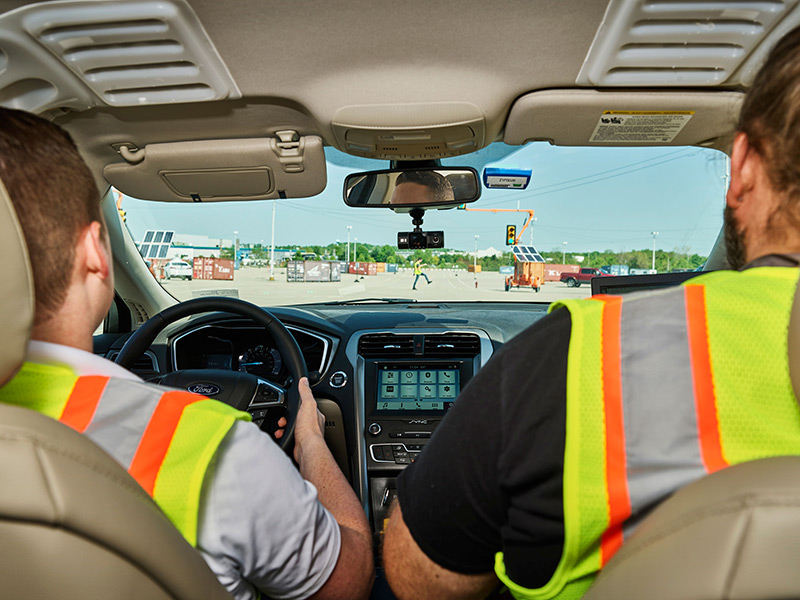
|
Argo这块20英亩的封闭式场地位于索尼曾经制造大屏幕电视的半退役工业园区里,是测试自动驾驶车辆的理想控制环境。公司在匹兹堡附近还有修车厂,在那可以调整软件,汽车甚至可以实现本地化,以匹配特定城市固有的驾驶习惯。 福特由Argo提供动力的自动驾驶汽车目前正在美国的五个城市进行测试,测试环境包括在匹兹堡卡内基梅隆大学周围铺设的殖民地时代马车走的路。那里的研究人员正在帮助该公司改进其计算机视觉和机器学习系统。(财富中文网) 本文另一版本登载于《财富》杂志2019年6月刊,标题是《臭鼬工程》。 译者:Agatha |
Argo’s 20-acre closed course, located in a semi-decommissioned industrial plant where Sony once built big-screen televisions, is the ideal controlled environment for testing robotic vehicles. And at the company’s depot in nearby Pittsburgh, software gets tweaked, and cars can even be ¬localized to match driving behaviors inherent to particular cities. Ford’s Argo-powered autonomous cars are currently being tested in five U.S. cities, including on the paved-over colonial-era horse paths around Pittsburgh’s Carnegie Mellon University. Researchers there are helping the company refine its computer vision and machine-learning -systems. A version of this article appears in the June 2019 issue of Fortune with the headline “Skunkworks.” |













